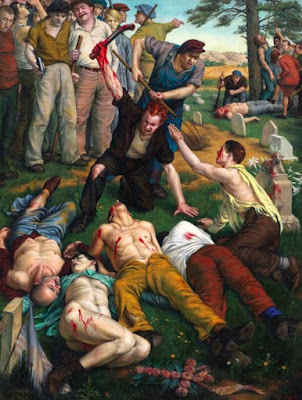A funny headline on
a piece over at Reason.com by Robby Soave. At Cornell, the Student Assembly voted down a resolution that called for a committee to look into the lack of political diversity in the Cornell faculty. The arguments against the resolution were summarized as:
(1) conservatives have not been historically oppressed as have other groups; (2) spending resources on intellectual diversity diverts resources from promoting other forms of diversity; and (3) conservative students are free to speak out in class if they find something disagreeable or wish to argue their own point of view....
The headline isn't very fair to that 3-point objection to having this committee. It focuses on #2 and distorts even that. I rather doubt that the cute, clickable headline was written by Soave, because he disapproves of campus conservatives acting like leftist students by "playing the victim" and inviting speakers who are "provocateurs" and not serious experts in "philosophy and policy."
I don't agree with Soave's disapproval. I think you can have philosophers and policy wonks and
also lively provocateurs, and I think it's worth exploring victimology —
who's really the victim? I've spent enough time around conservatives and libertarians to know that their pretensions about neutral, egg-headed reason feel hollow and deceptive much of the time to those of us who aren't already on their side. I believe it's unreasonable to deny that emotion is part of human reason, and
I have seen Reason magazine philosophy/policy types boil over with anger at the expression of that belief.
But I want to get back to that headline, inapt as it is for Soave's brief essay on the Cornell committee that was not to be. It seems like an argument through stating a paradox: They voted against diversity on the ground that it would hurt diversity. (It's reminiscent of that old Vietnam War line:
"It became necessary to destroy the town to save it.")
But it occurs to me that there are some ideas that are destructive of intellectual diversity. I don't mean ideas put into practice, such as censorship or discrimination based on viewpoint. I mean the ideas themselves. Within a free-speech approach, you can argue that censorship or viewpoint discrimination is a good idea. It would be censorship or viewpoint discrimination to exclude those ideas. People can see those arguments in the marketplace of ideas and decide for themselves if they want to buy them. You might say, but if people do accept those ideas, they might put them into practice, but if you believe in the overarching idea of free speech, you are trusting people to consider and reject the bad ideas, and you think the idea of free speech will win in the marketplace.
But there is one type of idea that just as an idea is destructive of the diversity in the marketplace of ideas. Do you see what it is? It's an idea that is so good it wrecks the market for all the competing ideas, the
completely convincing idea. There are many ideas like that — problems where the solutions have been discovered. We needn't puzzle over the possible answers anymore. We know (or feel sure that we know). That's the one type of idea that you should exclude if intellectual diversity is your most sacred goal. That shows why intellectual diversity can't be your
highest goal. Why would you exclude the most devastatingly obviously
correct ideas?
I'll pose one answer to my question and let you decide whether you want to buy it: You'd exclude those ideas when you have other ideas you want to protect from competition. So then there's this corollary: To genuinely love intellectual diversity and to want to exclude one of the ideas is to admit that it's devastatingly better than those other ideas.
And, yes, yes, of course I know that "they" do not
really love intellectual diversity. It's a hypothetical.
Assume genuine love for intellectual diversity. Assume it is really and truly your highest value. If you had 10 ideas about how to solve a particular problem and a new idea came along that was so obviously true that no one would bother with the other 10 anymore, you would suppress the 11th idea, so that you could continue to benefit from the vibrancy of 10 living, breathing ideas.
If that's all too abstract, think it through in the context of a culture with 10 thriving religions and the question whether to ban the discussion of atheism.




